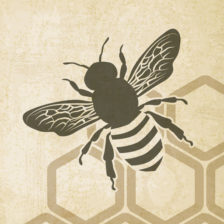The April 23, 2016 edition of the Apis Information Resource News has been published. Below find an excerpt from the post:
Earth Day is upon us. It becomes a bigger deal every year since the first one in 1970. There’s plenty to be pessimistic about (it correlates to the massive bleaching of Australia’s barrier reef ), but there is also optimism in some quarters concerning the recently signed Paris accords.
The swarm we were able to collect last month is doing well. In fact we had to add another super. Rule of thumb: add another super when bees cover all frames during the nectar flow. Our other three colonies appear to be ok, including the one the swarm issued from. We should be able to collect some honey in the near future. Unfortunately, the honey flow appears to be on its ebb, so much so that colonies have turned to other activities like “washboarding,” something characteristic as the summer heat begins here in North Central Florida.
There’s still time to complete the Bee Informed Partnership’s online survey. It will close on April 30th. Please do not complete the survey more than once. Information about past Winter Loss and National Management Surveys and the annual reports can be found online at http://beeinformed.org/.
My surgery has been postponed to Monday April 25 to remove the “tumor” characterized as verrucous carcinoma, lower right jaw. This includes removal of teeth and mandibular “resection” to carve out bone the cancer has penetrated. A section of my right fibula will be used to reconstruct the jaw. It will be removed from my right leg along with the vascular system to replace cancerous bone removed. This is a technique called “micro vascular surgery,” and is considered “routine.” That’s for the surgeon, not the person going through it.
Some history of this is found in Princples of Microsurgery “In the 1980s, an emphasis was placed on improved function with autologous tissue transplantation, which is exemplified in mandibular reconstructions for cancer. Composite grafts consisting of soft tissue and bone aided in stabilizing the mandible, assisted with mastication, and allowed for reliable coverage during the postoperative period, when radiation usually was required. Today, microsurgical techniques have become an integral part of the armamentarium for plastic surgeons, allowing for soft tissue coverage and function after trauma or oncologic resections.” Two days ago, I was fitted with a G-tube for external feeding as I will be unable to eat during the much of healing process. Whether radiation is required after the surgery is up in the air.
All this of course impacts my schedule going forward. Again, I should have enough time to recover before the Cuba event in July that I discussed last month. I continue to have conversations with TRANSEAR about the 12th Latin American and 6th Cuban Apicultural Congresses in Havana, but of course cannot guarantee my participation at the moment. Again, the costs are expected to be from $2100 to $3800, depending on accommodations selected. The Congress is expected to have simultaneous translation into English. For more details see the official web site. Several readers have sent me e-mails indicating an interested in attending. Please let me know if you would like to be a part of this trip.


